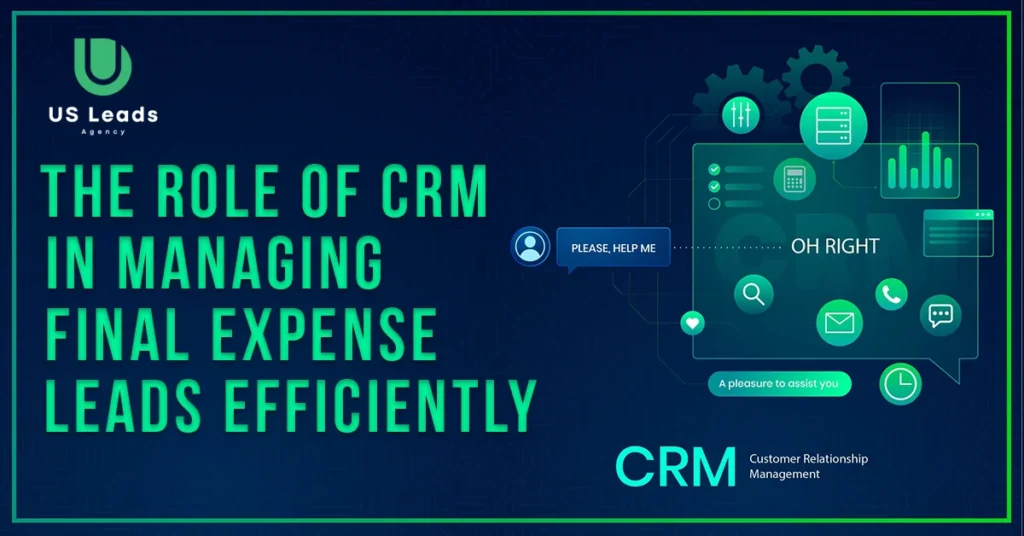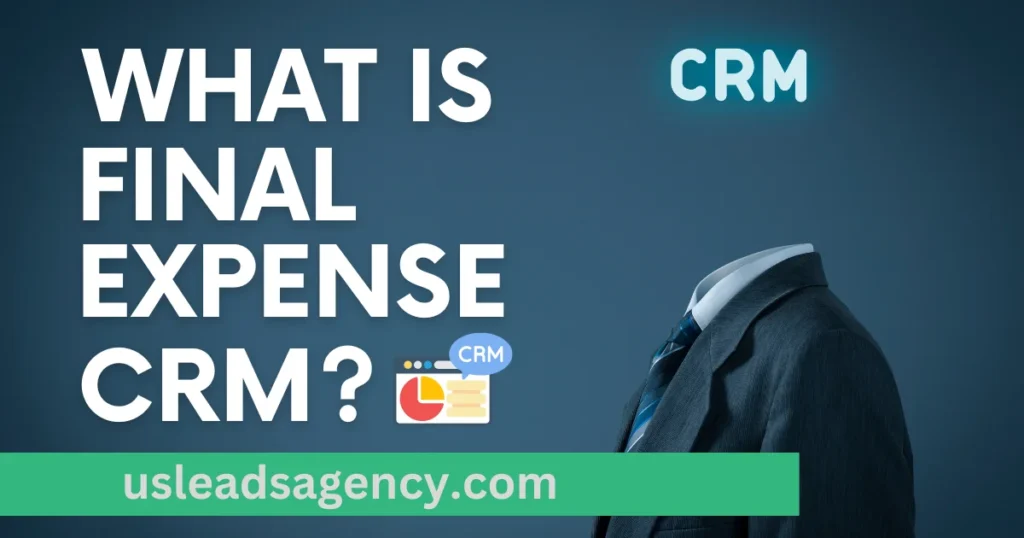
What is CRM?
Do you want to know about final expense insurance CRM?
Well, we have written this great blog only for you to understand final expense insurance CRM and its role in managing final expense leads efficiently.
What is a Final Expense Insurance CRM?

A Final Expense Insurance CRM is a tool for insurance agents selling final expense policies. It is not just another generic Customer Relationship Management (CRM) software, that fits all industries or specialties, but a software specifically designed to address the concerns that every final expense insurance agent encounters daily.
This CRM is specifically designed for final expense leads, contacts, and related tasks, offering features optimized for these processes. It’s like having an assistant dedicated to understanding all aspects of your company, from lead generation to policy details.
Key Features of a Final Expense Insurance CRM:
There is one particular characteristic that is particularly prominent in a Final Expense Insurance CRM and that is the lead-capturing facility. It’s not just as simple, as storing the name and contact of the lead; it involves managing the interaction; follow-ups, and turning the lead into a client efficiently. for instance, it is possible to schedule follow-up reminders or even have the software send out an email automatically based on a set of conditions.
The next concept in the spotlight in this kind of specialized CRM confronts contact management. Just think about it: all the information you have about your clients, starting with their basic data and ending with the policy details, and everything would be strolling in one folder! You can enter, edit, or even append notes on a record, and make appointments, appointment without the need for having to switch between apps or software.
A Final Expense Insurance CRM is more than just software; it’s an essential tool for final expense agents.
Why Do You Need A Specialized CRM For Final Expense Insurance?
For an insurance agent, a good Customer Relationship Management (CRM) strategy is nothing new to you. Nevertheless, the generic CRM falls short when it comes to final expense insurance.
Why? This is the reason why final expense insurance can be considered to be one of the most popular but still a quite specific type of insurance, which is focused on a specific segment of the population and which is facing quite significant difficulties and meeting quite significant problems to meet the needs of its customers. The targets are normally the elderly ones who arrange for their funeral expenses, which is an uncomfortable affair and, therefore, requires diplomacy. That is why generic CRMs are not designed to address such features of final expense insurance.
For example, if you tend to work with hundreds of leads in your pipeline, then you might benefit from using pipes. In a case where an organization implements a generic CRM, there is a tendency for the software may fail to show whom to support or follow up with. But, with a specialized final expense insurance CRM like Agent CRM, all your leads are pre-sorted according to their needs and wants – how great is that?
Understanding The Role of CRM In Managing Final Expense Leads:
CRM software simplifies final expense lead management by offering tools to boost sales, improve customer interactions, and enhance overall performance. Here’s a detailed look at the role of CRM in managing final expense leads:
1. Lead Tracking and Management:
Every final expense leads and these leads’ progress can be contained in CRM systems and it is comprehensive in its storage. This database allows agents to:
- Capture Leads Efficiently: Every lead that is gathered from all the sources like websites, social media, or any marketing communication can be directly categorized in the system.
- Track Lead Progress: Every lead in the funnel should be checked on the status at this certain moment starting from the moment of its contact to the moment of sales closure concerning this lead.
- Assign Leads: It distributes leads to the respective sellers based on the business requirements such as geographic area, product area of interest, or working capacity.
2. Customer Interaction and Communication:
Thus, in the final expense insurance business, particularly, clear communication between buyers and sellers or insurance agencies is essential. CRM systems facilitate this by:
- Centralizing Communication: Append all the communications made in the past including e-mails, calls, and meetings in one place This ensures that the agent working on the case can look at the previous interaction to know what to do.
- Automating Follow-ups: In the case of the leads, it is suggested to systematize the follow-up and notification processes with the purpose of the systematic check of the leads ‘activity and reply and the improvement of the customer relations which will translate into the increase of the conversion probability.
- Personalizing Interactions: Use the information of CRM to provide messages that are of interest, need, and previous communication with the customer.
3. Marketing Automation:
CRMs often include marketing automation tools that can significantly enhance lead generation and nurturing processes by:
- Email Campaigns: Develop and create letters to introduce final expense insurance and all the aspects of it to the clientele base.
- Segmentation: Target thus from the segmentation level to come up with good and attractive marketing communiques.
- Tracking Campaign Effectiveness: Supervise the operation of the Marketing promotions, in a bid to differentiate that is efficient in the process of enhanced Marketing yields.
4. Data Analysis and Reporting:
Since lead management relies on the usage of data, decisions based on data offer a proper management method. CRM systems offer robust analytical tools that help:
- Analyze Lead Data: Thus, having analyzed such results as leads, received, the rate of their conversion, and other parameters, it will be possible to determine tendencies and possible problem areas.
- Forecast Sales: Projects the amount of sales for the future which is important in designing the plan of selling and controlling the resources.
- Measure Agent Performance: All agent performances should be recorded in the field for training on their strengths as well as areas where they are weak.
5. Compliance and Security:
Like other types of insurance companies, final expense insurance carriers handle the customers’ details which are often highly personal. CRM systems help maintain compliance and security by:
- Ensuring Data Protection: It must be reasonable and involve adequate measures that shall protect customers’ details against hacking and other related vice.
- Maintaining Compliance: Ensure that there is no change in the laws and ethos of the particular industry to make all the relations with the customers and the management of their data proper.
6. Integration with Other Systems:
CRM systems can connect with other business tools for smoother operations.
- Policy Management Systems: There is a need to interface it with the policy management software to decrease the lead generation to policy issuing timeframe.
- Payment Processing: Link to payment processing systems as a way of optimizing the efficiency of billing and collections from customers.
- Customer Service Platforms: Further link up with the customer service systems to provide the policyholders with comprehensive service and assistance.
7. Enhanced Customer Experience:
Ultimately, the role of a CRM in managing final expense leads efficiently boils down to enhancing the customer experience:
- Streamlined Processes: Reduce the time and effort required to manage leads, allowing agents to focus more on customer service.
- Consistent Interactions: Ensure that all customer interactions are consistent and professional, building trust and loyalty.
- Proactive Service: Use CRM data to anticipate customer needs and offer proactive service, improving satisfaction and retention.
Benefits and Challenges of Using CRM Lead Management:
Implementing CRM systems for lead generation and management brings a host of advantages, but it’s not without its challenges. Let’s delve into the benefits and hurdles:
Benefits of Using CRM Lead Management Software:
i. Improved Lead Tracking and Management:
Several CRM systems’ lead tracking software stand out in the management and tracking of leads, and in forming a pool for all leads’ interactions. This helps you follow up effectively, preventing missed opportunities with potential customers.
ii. Enhanced Customer Engagement:
With the acquisition of customers’ data and information, the communication is personalized by CRM. Direct communication also assists in creating goodwill and trust between the leads and the firm.
iii. Data-Driven Decision Making:
CRM systems offer powerful analytics to help you make informed business decisions. It is very helpful to make specific adjustments to high-level lead generation strategies within this framework.
iv. Efficient Communication:
Thus, working automation within CRM enables the rationalization of communicational procedures. Whether it is used for the creation of informative and persuasive emails to be sent at certain instances, or for management of follow-up tasks related to a particular lead, CRM guarantees that the send message reaches the intended recipient at the right time.
v. Increased Sales Productivity:
Automating routine tasks with sales software lets sales teams focus on nurturing leads and closing deals. This in turn is likely to enhance the general productivity, and hence lead to improvement of the organization’s performance and profitability.
Challenges of Using a CRM Lead Management System:
i. Implementation and Onboarding Hurdles:
Organizations can experience some level of resistance when implementing CRM and some of the challenges are likely to be experienced during the initial implementation phase. One has to train the staff and ensure that there is a proper onboarding process on how to overcome these barriers.
ii. Data Security and Privacy Concerns:
When dealing with clients’ information, there is a role of guaranteeing the highest safety measures. Issues of this kind are relevant to concerns with data security, access to sensitive customer information, and legal requirements for data privacy.
iii. Integration Complexity:
CRM implementation is often challenging due to the workaround existing systems. It becomes extremely vital to ensure that there is a proper integration of all the systems to prevent conflicts in the data exchange.
iv. User Adoption Challenges:
If team members don’t fully embrace the CRM system, its effectiveness diminishes. Encouraging and ensuring widespread adoption requires ongoing training and support.
v. Costs and ROI Measurement:
The initial investment in CRM implementation and maintenance can be significant. Measuring the return on investment (ROI) becomes crucial.
While CRM systems significantly contribute to effective lead generation, businesses must navigate challenges to maximize the benefits. Strategic planning, continuous training, and a proactive approach to addressing challenges are key to a successful CRM implementation.
Conclusion:
CRM systems can also help manage overall sales costs efficiently. These systems provide a set of tools and opportunities regarding lead capture, customer interaction, marketing, analysis, regulation, integration, and ways to facilitate further customer satisfaction. Thus, the mentioned capabilities contribute to enhancing the value of lead management concerning its NLE implications in final expense insurance as a means to obtain higher conversion rates and subsequently, better business performance.
FREQUENTLY ASKED QUESTIONS:
Q: What is CRM software, and how does it relate to insurance agencies?
CRM software, or Customer Relationship Management software, is a technology solution that helps businesses manage and nurture customer relationships. In the context of insurance agencies, Insurance CRM refers to CRM software specifically designed for the insurance industry. It helps insurance agencies centralize customer data, automate processes, and provide personalized service, ultimately enhancing customer interactions and boosting business performance.
Q: Can Insurance CRM help with lead generation and conversion?
Yes, Insurance CRM can significantly impact lead generation and conversion. The software enables lead scoring, which helps agents prioritize leads based on their potential. Automated workflows also ensure timely follow-ups, nurturing leads until they are ready to make a decision, increasing the chances of conversion.
